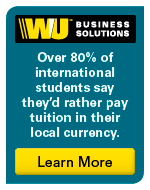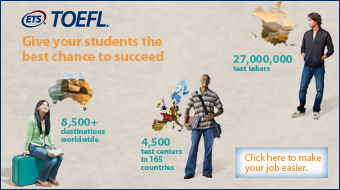
| IIE Home | Membership | Publications | Open Doors | Contact Us | Subscribe |
|
||||||||||||||
|
||||||||||||||
|
News
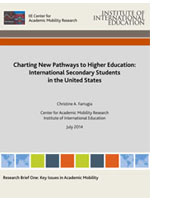 A new report published this week by the Institute of International Education, "Charting New Pathways to Higher Education: International Secondary Students in the United States," provides comprehensive analysis on the more than 73,000 inbound international students who come to the United States for high school and what the trends mean for higher education enrollments and recruitment. The findings on high school student mobility complement the data that IIE releases each year on international college and university students in the United States in the annual Open Doors report; both reports are produced with the support of the U.S. Department of State’s Bureau of Educational and Cultural Affairs. A new report published this week by the Institute of International Education, "Charting New Pathways to Higher Education: International Secondary Students in the United States," provides comprehensive analysis on the more than 73,000 inbound international students who come to the United States for high school and what the trends mean for higher education enrollments and recruitment. The findings on high school student mobility complement the data that IIE releases each year on international college and university students in the United States in the annual Open Doors report; both reports are produced with the support of the U.S. Department of State’s Bureau of Educational and Cultural Affairs.The new IIE report looks closely at where the students come from and where they study—with breakdowns by U.S. state and types of schools. It provides narrative analysis and data tables that compare specific numbers and trends for international students at the secondary level with those for international students in higher education in the United States.
"While secondary school students from around the world have been coming to the United States on high school exchange programs for many years, IIE’s new analysis shows that the number of students who enroll directly in U.S. schools to earn a U.S. high school diploma now significantly outnumbers those who are here on exchanges," said IIE’s Deputy Vice President for Research and Evaluation, Rajika Bhandari. "This is a remarkable finding, and one which has implications for U.S. higher education."
The report was the subject of media coverage yesterday in Time Magazine, USA Today, Inside Higher Education, Chronicle of Higher Education, The PIE News, and Education Week. 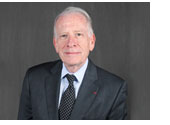 IIE President Allan Goodman’s latest blog shares about his trip to Madrid to attend the reception for Spain’s new king, Fulbright alumnus Felipe VI. Dr. Goodman was executive dean at the Georgetown School of Foreign Service when Felipe was admitted to the school in 1993. "In Felipe, what you see is what you get. And I am already proud of him," writes Goodman. IIE President Allan Goodman’s latest blog shares about his trip to Madrid to attend the reception for Spain’s new king, Fulbright alumnus Felipe VI. Dr. Goodman was executive dean at the Georgetown School of Foreign Service when Felipe was admitted to the school in 1993. "In Felipe, what you see is what you get. And I am already proud of him," writes Goodman.Delhi University—India’s top university—was ordered by the higher education regulatory and funding body to dismantle their four-year degree program after a recent switch from the three-year British-style model. According to an article in University World News, Vice-chancellor Singh "had touted the change to four years as a switch to a modern programme in tune with global higher education systems that would facilitate student mobility and inter-university credit transfers." But the highly politicized decisions met with strong resistance from faculty members and students.
If you are isolated, poor, and enamored of the prestigious university offering the MOOC (massive open online course) you’re taking, you are less likely to complete it. This finding, along with four others, is shared in a recent article in the Chronicle of Higher Education, which summarizes early research outcomes of the MOOC Research Initiative, backed by the Bill & Melinda Gates Foundation.
The Department of Homeland Security (DHS) this week launched an enhanced Study in the States website, which serves as "an information hub for international students in the U.S." New features include an "Ask a Question" section and an extensive school search page. The updated site also features a blog geared to international students and school officials, which can be translated into multiple languages.
Conferences
.jpg) Priority Deadline: July 18, 2014 Priority Deadline: July 18, 2014Register by the Priority Deadline to Attend the School Visits and get your Profile in the Study America Guide for Free
Enter Code HEFF14 when registering to receive the 10% IIENetwork member discount.
8,400 visitors attended IIE fairs last year. With over 30 years of experience organizing strategically marketed international student fairs, IIE can help you meet your student recruitment targets. IIE offers pre-fair seminars for students to learn about the U.S. higher education system and general admissions requirements—so you can be sure to meet well-informed, qualified students.
New this year: IIE is offering school visits, networking events with local school counselors, and expert informational seminars on country-specific trends in education in each city on our tour.
IIE’s U.S. Higher Education fair series helps you build your institution’s name and profile in selected cities in key Asian countries in a well-planned sequence, timed to minimize your travel and maximize your impact. Join us in this exciting and promising fall 2014 fair series:
IIE promotes direct communication between regionally accredited U.S. schools and students; no third party recruiters are agents are permitted at our events.
October 20–22, 2015 | Quito, Ecuador
Organized under the theme "The Internationalization of Innovation, Science and Technology: Building an Inter-American Agenda," the CAIE invites high-level governmental authorities and academics, as well as managers and decision makers in higher education to participate in the 2015 event, with the aim of exchanging ideas and learning about public policies, models, paradigms, best practices and trends within fields of current interest as well as making high-impact institutional collaboration contacts. The CAIE 2015 will be coordinated at the national level by the YACHAY Public Company, which manages the City of Knowledge.
After three successful events in Canada (2010), Brazil (2012) and Mexico (2013) with the participation of 2316 delegates from 52 countries, CAIE-Ecuador 2015 will focus on a series of strategic themes related to the Internationalization of Innovation, Science and Technology. Not only will it address models, paradigms, best practices and higher education internationalization indicators and the internationalization of higher education in its various essential dimensions, but it will also examine internationalization at home, and the internationalization of the curriculum. It will address the important theme of training for managers on internationalization.
If you have any questions, please contact caei@oui-iohe.org.
Deadlines
Application Deadline: July 15, 2014 | Application and Program Details
The Forum on Education Abroad has launched a new training program in support of IIE's Generation Study Abroad Initiative. The Education Abroad Capacity Review will engage a select group of 12-15 U.S. higher education institutions in their efforts to strategically expand their study abroad capacity while ensuring quality and standards of their programs. The program is open to any U.S. higher education institution that is a Generation Study Abroad Commitment partner.
The Education Abroad Capacity Review is based on the Forum’s Quality Improvement Program (QUIP), which provides an objective, peer-reviewed method to assess and improve an organization’s goals in terms of its mission, conditions and resources. Based on the Forum’s Standards of Good Practice for Education Abroad, QUIP has been used successfully by a wide range of diverse institutions and organizations in the U.S. and abroad.
The Education Abroad Capacity Review is a customized 6-month QUIP review for Generation Study Abroad Commitment Partners that focuses on assessing and expanding education abroad capacity at all types of institutions and organizations, whether they are sending colleges or universities, program provider organizations, or host universities. The processes and exercises of this Education Abroad Capacity Review are designed to evaluate the organization’s mission and goals and assess enabling conditions and challenges in light of the Forum’s Standards and the best practices in the education abroad field. The 6-month program will begin in late August.
Fulbright
 Application Deadline for Most Awards: August 1, 2014 Application Deadline for Most Awards: August 1, 2014The Fulbright U.S. Scholar Program offers nearly 600 awards in teaching, research, and combination teaching/research awards in over 125 countries for the 2015-2016 academic year. Opportunities are available for college and university faculty and administrators as well as for professionals, artists, journalists, scientists, lawyers, independent scholars, and many others.
Interested faculty and professionals are encouraged to learn more about core Fulbright U.S. Scholar opportunities by visiting the online Catalog of Awards. The application deadline for most awards is August 1, 2014. U.S. citizenship is required. For other eligibility requirements and detailed award descriptions, please visit the program website.
The Fulbright Program, sponsored by the U.S. Department of State’s Bureau of Educational and Cultural Affairs, is the U.S. government’s flagship international exchange program and is supported by the people of the United States and partner countries around the world. For more information, visit eca.state.gov/fulbright. Partnerships
An article in Diverse reports on the recent arrival of 15 exchange students from Cuba for a semester of study at Miami-Dade College—the first time in more than 50 years that the Cuban government had permitted students to come to the United States to study. "Despite a host of challenges, institutions in both countries have expressed the need to expand exchange opportunities; not only for students, but also for faculty and researchers," said IIE President Allan Goodman when contacted for the article. "The potential for collaboration is clear and the motivation is high."
Study Abroad
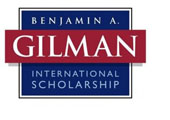 July 30, 2014 at 11:00 AM CDT | Register Online July 30, 2014 at 11:00 AM CDT | Register OnlineThe U.S. Department of State’s Benjamin A. Gilman International Scholarship Program would like to invite you, your colleagues, and your students to participate in our upcoming webinar in our Gilman Web Symposium Series for the 2013-2014 academic year, "Opportunities and Challenges for Minority Students in Education Abroad."
This online forum, moderated by Gilman Program staff, will bring together panelists to discuss minority students’ participation in education abroad. Panelists will include: Dr. Karyn Sweeney; SUNY New Paltz International Programs and Educational Opportunity Program staff; and Gilman alumni.
The Gilman International Scholarship Program is sponsored by the Bureau of Educational and Cultural Affairs (ECA) at the U.S. Department of State and administered by the Institute of International Education (IIE). The Gilman Program diversifies the kinds of U.S. undergraduate students who study and intern abroad and the countries and regions where they go by awarding over 2,700 scholarships annually. To learn more about the Gilman Scholarship Program, please visit the website at www.iie.org/gilman or contact gilmanadvisors@iie.org.
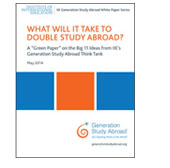 The outcomes from IIE’s Generation Study Abroad Think Tank, have been documented in the IIE green paper, "What Will it Take to Double Study Abroad?" This paper lays the foundation for an ongoing discussion around how to increase the number of students studying abroad in the short term and to shift the paradigm over the long term. We encourage you to share your insights and best practices with the community by commenting on the 11 Big Ideas outlined in the paper. The outcomes from IIE’s Generation Study Abroad Think Tank, have been documented in the IIE green paper, "What Will it Take to Double Study Abroad?" This paper lays the foundation for an ongoing discussion around how to increase the number of students studying abroad in the short term and to shift the paradigm over the long term. We encourage you to share your insights and best practices with the community by commenting on the 11 Big Ideas outlined in the paper.Idea 5: Engage the foreign language learning community as an ally and partner
Foreign language teachers, associations, organizations and other parent groups that support language learning are natural allies. Many have established networks and are strong advocates for global awareness, international experience and study abroad.
Share your insights and best practices on this topic: Submit a comment on our blog.
A recent article in U.S. News & World Report discusses the recent jump in the number of community college students choosing to study overseas. "I think many more students are realizing that study abroad is basic training for the economy," according to IIE’s Daniel Obst, who cited student interest, as well as community college investments fueled in part by federal money, as primary reasons for the increase in student travel.
|
| www.iie.org/iienetwork • Member website of the Institute of International Education © 2025 Institute of International Education. All rights reserved. |

